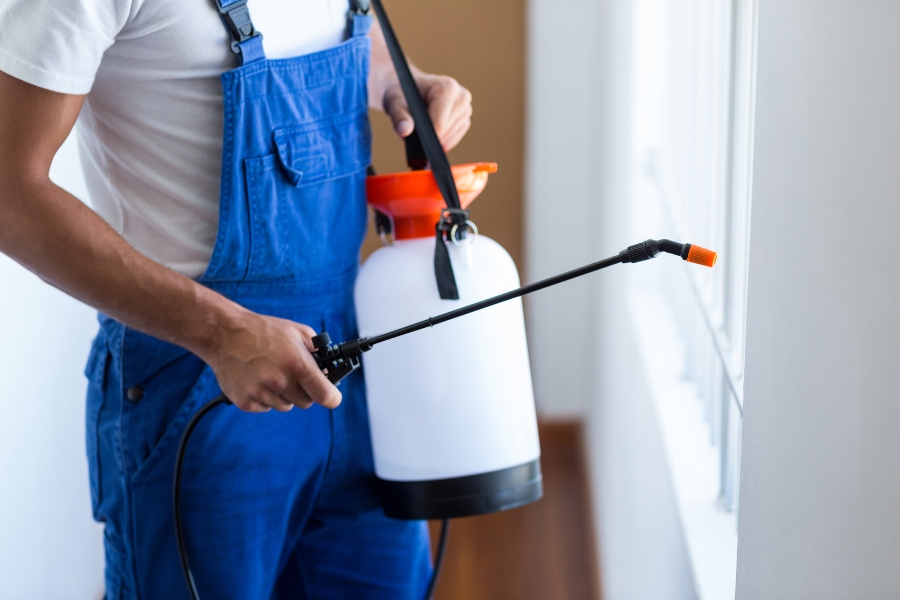Pest Control Clovis Professionals: Protecting Your Family Members and Home
Wiki Article
Comprehending the Different Strategies to Bug Control: A Comprehensive Overview

Natural Pest Control Approaches
Utilizing environmentally friendly techniques such as friend planting and organic parasite control is necessary for effectively managing insects in agricultural settings. Buddy planting involves expanding various crops in closeness to prevent insects, improve nutrient uptake, and enhance total crop wellness. Planting marigolds along with tomatoes can assist push back nematodes. Intercropping maize with vegetables can disrupt the reproduction patterns of parasites like corn borers.Organic pest control includes introducing natural killers or virus to control pest populaces. Ladybugs, for example, eat aphids, controlling their numbers without the need for chemical pesticides. Another instance is making use of Bacillus thuringiensis (Bt), a microorganism that targets particular insect pests while being harmless to human beings, pets, and beneficial pests.
These eco-friendly techniques not only decrease the dependence on synthetic pesticides however also help preserve biodiversity and soil wellness. By incorporating all-natural bug control strategies right into farming practices, farmers can attain sustainable insect management while lessening negative effects on the environment.

Chemical Pest Control Solutions
Along with all-natural bug control approaches, the usage of chemical pest control solutions plays a significant duty in efficiently managing pest populations in farming environments. Chemical pest control remedies are developed to target certain insects that might cause considerable damages to plants. These solutions usually have artificial chemicals that are made to get rid of parasites quickly and successfully.Among the vital benefits of chemical parasite control remedies is their effectiveness in controlling parasite infestations on a big scale. Farmers can use these options using various techniques such as spraying, fumigation, or seed treatment to safeguard their crops from damaging pests, weeds, and conditions. Additionally, chemical insect control options are fairly simple to apply and can offer quick results, aiding farmers safeguard their yields and reduce economic losses.
However, it is necessary to utilize chemical pest control remedies carefully to minimize prospective adverse effect on the setting, non-target organisms, and human health. Correct application methods, adherence to security standards, and regular surveillance are crucial to make sure the liable use chemical parasite control Source options in farming methods.
Organic Insect Control Approaches
Biological parasite control approaches utilize all-natural predators or virus to handle bug populaces in farming settings successfully. One usual organic control approach is the intro of all-natural adversaries, such as ladybugs or parasitic wasps, to target particular pests.An additional biological control method entails using pathogens like infections, fungis, or bacteria to contaminate and kill insects. On the whole, organic bug control methods provide a lasting and targeted remedy to pest administration in farming.
Integrated Insect Monitoring (IPM)
Integrated Parasite Administration (IPM) is a comprehensive strategy that incorporates numerous insect control approaches to properly take care of and decrease pest populaces in farming systems. IPM focuses on long-term prevention of bugs through a combination of organic, cultural, physical, and chemical control techniques. By incorporating these different methods, IPM aims to decrease reliance on chemical pesticides, reduce environmental impact, and promote lasting insect monitoring methods.
One key element of IPM is making use of biological controls such as natural killers, bloodsuckers, and virus to regulate insect populations. This technique harnesses the power of nature to maintain an equilibrium between pests and their natural adversaries without creating damage to the environment.
Furthermore, IPM includes social techniques like crop sanitation, turning, and environment adjustment to produce unfavorable problems for insects and interrupt their life process. Physical controls such as obstacles, composts, and traps are likewise made use of to avoid insect problems.
Physical and mechanical Parasite Control Techniques
Utilizing non-chemical methods, such as physical and mechanical bug control techniques, is an essential element of thorough insect administration approaches, building upon the structure of Integrated Bug Monitoring's alternative strategy. Mechanical bug control involves the use of physical barriers or catches to avoid bugs from accessing and harming plants or frameworks. This method can include strategies like mounting screens on home windows, using row covers in farming, or using sticky catches to catch bugs.Physical bug control methods, on the other hand, concentrate on directly removing bugs via physical means. Using heat read this article treatments to eliminate bed pests or vacuuming up parasites like ants or crawlers can be reliable means to handle infestations without the use view it now of chemicals. By integrating these physical and mechanical bug control techniques into an Integrated Pest Administration plan, specialists and people can minimize reliance on chemicals while still properly managing pest populaces and decreasing damage.
Verdict

In enhancement to natural insect control methods, the utilization of chemical pest control options plays a significant duty in efficiently managing pest populations in agricultural atmospheres.One of the crucial advantages of chemical pest control solutions is their efficiency in managing insect infestations on a large range.Integrated Pest Administration (IPM) is a comprehensive technique that combines different bug control strategies to properly handle and decrease pest populations in agricultural systems.Using non-chemical techniques, such as physical and mechanical pest control methods, is a crucial element of detailed bug monitoring methods, constructing upon the foundation of Integrated Pest Administration's all natural strategy. By incorporating these mechanical and physical bug control strategies right into an Integrated Pest Management plan, professionals and individuals can decrease reliance on pesticides while still successfully reducing and handling pest populaces damages.
Report this wiki page